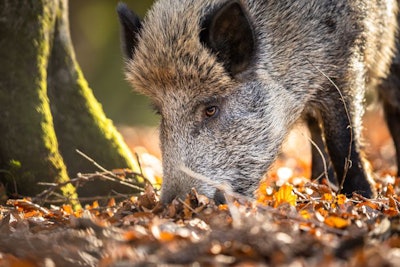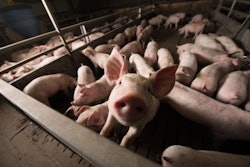
To help prevent wild boar transmitting African swine fever to domestic pigs in South Korea, authorities have announced plans to extend existing fences.
Authorities in South Korea are to install more fencing to control the spread of African swine fever (ASF).
Previously erected barriers to keep wild boar away from domestic pigs were effective, reports Yonhap. Despite the growing number of wild animals testing positive for the virus — currently totaling 883 since October 2019 — there were no cases in farmed pigs for almost exactly one year.
During October, the virus was detected on two farms. Subsequent investigations revealed traces of the virus in an area outside the fenced area. This prompted the authorities to extend the barrier, according to the news agency. In addition, pig owners are being urged to step up preventative measures, such as spreading quicklime around their barns.
Between November 16 and December 10, 73 wild boar from the northern border have tested positive for the ASF virus. All these animals were found in the provinces of Gangwon or Gyeonggi, according to recent reports from the South Korean agriculture ministry to the World Organisation for Animal Health (OIE).
Second ASF outbreak confirmed in Myanmar
After two pigs from a backyard herd in western Myanmar died during the first week of November, presence of the ASF virus was confirmed. According to the official report to the OIE, the affected herd comprised 158 animals. Like the previous outbreak in mid-October, the infected herd was in Sagaing state.
Taiwan pork company pulls out of Vietnam
Taiwan Sugar Co. is taking its first step in withdrawing from pig farming in Vietnam.
According to Taiwan News, the firm says the ASF situation is the reason for its decision to re-direct its resources to production in its home market. By closing its largest facility in the country, the firm is to spend TWD10.7 billion (US$380 million) updating its facility in Taiwan with new ventilation systems and water-saving measures.
Taiwan Sugar entered the Vietnamese market in 1997, building up its herds to around 35,000 pigs. When ASF first broke out in the country early in 2019, the company began to scale back production. Currently, it has just 3,000 animals on two farms. With one facility scheduled to close, the other will also be cut back.
Philippines tightens disease controls ahead of festive season
Ahead of the coming holidays, authorities in one city in the Philippines have announced a ramping-up of measures to keep out ASF.
Philippines News Agency reports that quarantine will be tightened to prevent smuggling of pork products during the festive season. To keep the infection out of the city area, only commercially produced pork with appropriate ASF-free certification will be allowed to pass.
Davao City is located on the island of Mindanao, where ASF are detected sporadically.
More wild boar in Russia’s Far East test positive for ASF virus
Between mid-November and December 10, 26 wild boar in the Far Eastern federal district have tested positive for the ASF virus, according to Russia’s agriculture ministry.
In its most recent reports to the OIE, the ministry records six of the outbreaks in Khabarovsk oblast, five in Primorsky krai, and one in Yevreyskaya (Jewish Autonomous oblast). Previous cases have occurred in these regions since ASF first arrived in the federal district in July 2019.
South Africa records two further ASF outbreaks
During November, pigs at two more farms in the Randfontein area of Gauteng province were affected by ASF.
According to the report of the agriculture department to the OIE, these outbreaks involved a total of 9,500 animals. This made them among the country’s larger outbreaks, which now number 28 since April 2019. So far, all cases have been located outside South Africa’s ASF Control Zone.
View our continuing coverage of the global African swine fever situation.

















